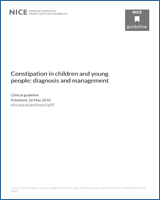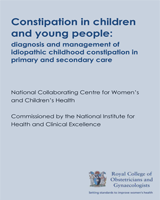| 1 | a) Health professionals need to be more updated. b) Waited previously in another health board for a year before your appointment (standardised care). c) Parents feel that they need more information on the subject. |
| 2 | a) What the nurse/doctor can do to help you. b) Which medicines are best. c) Alternative treatments. |
| 3 | a) The service has improved in the last 5 years. b) There is less embarrassment due to it being more in the open now. |
| 4 | Wish it wasn't so embarrassing. |
| 5 | a) CD given to parents with information on it b) Getting phone numbers and contact numbers for other treatments. |
| 6 | a) Medicine makes it taste better especially in lollies. b) Stickers and books help going to the toilet because you can have a sticker when you do a poo because it makes it fun. c) People should listen to me. d) Explain things in an easy way and make me important when you talk to me. |
| 7 | No |
| 8 | Thank you for helping me and others. |
| 9 | - |
| 10 | a) Why does this problem start? b) How can it be resolved? c) Will it ever get better? d) Is there any other way to fix it?, e) Will it ever stop? |
| 11 | It is good that my mum can phone a nurse for help when I am in pain with my problem. |
| 12 | a) It can effect all aspects of a child's life (disrupts sleep, puts them off food, confidence using toilet outside of home). b) Parents feel responsible for the problem yet helpless to do anything about it. c) Tummy ache can be distressing / stressful for the child and parent. d) It is not something that parents like to talk about. e) Info on ‘type’ of poos was useful when first diagnosed. |
| 13 | Try and make going to the toilet fun! Otherwise it becomes very hard work when they don't want to go. |
| 14 | a) Having a pooing problem does not mean your child is lazy, dirty. b) It's not their fault just try to help your child in every way you can c) Don't call names or shout at them because it only makes things worse, d) If you keep on saying you are going to sit on the toilet until you do it it won't work either it will only make your child's brain shut off from your voice e) Please help your son and keeps praying him when he does try and use the toilet cause he will every time I go on the toilet mum/dad will say I'm a good girl/boy it does help! |
| 15 | a) Advice on diet and drinks, b) Activity c) All our visits have been informative, friendly, helpful. Help given by lovely doctor, nurses and staff. |
| 16 | a) Patience b) Friendly and approachable staff always make things easier. |
| 17 | 17. a) The parents could be very embarrassed about it and be finding the whole thing very stressful so be supportive b) The child is getting bullied so will be taking the subject very seriously and may not want to talk about it. |
| 18 | - |
| 19 | - |
| 20 | a) Talk to other parents with children similar problems. b) Nurses very supportive. |
| 21 | Cannot think of anything. |
| 22 | a) It is not just behaviour problems b) Child has confidence to say if has pain c) Parental support d) Parental groups e) Made to feel guilty by pharmacist re cost of medication methylcellulose (liquid). |
| 23 | Had idiopathic constipation – had to constantly tell problems to doctors and try different medications before diagnosis and appropriate treatment. |
| 24 | Nothing. Talking to children. Picture. |
| 25 | To play whilst looking at me. |
| 26 | Nothing. Doctors don't talk to me much. |
| 27 | Do what you can to sort out the problems because it's upsetting because it would give him better quality of life without [the] problems he is currently facing. |
| 28 | To make it more easiest to talk about. To explain the treatments better. To be understanding and gentle. |
| 29 | Child: I don't want to do a poo in my pants. How do I stop it happening? How many senna tablets should I have? How can I make my poo soft? Can you ask the sticker company to carry on making the stickers (for the sticker reward chart) Parents: Reassurance it will stop. Advice as to emergency care. I have taken him to A&E when rolling around on the floor in pain and felt they didn't understand. |
| 30 | It's embarrassing changing my pants. That people can smell the poo. Not being able to wear boxer shorts. Being able to understand words about my problem. Why does it take so long to get to normal and wishing that I could be like a normal boy not pooing in my pants. |
| 31 | – |
| 32 | – |
| 33 | Following “the plan”. Give it a go. “Poo” models. |
| 34 | Not to interrupt TV programmes, See children at weekends. Simple wording. Make it as interesting as possible. |
| 35 | 35. a) Depending on the age of the child, stress can play a big part in this type of problem. Speak to them as a child basis and in a friendly manner. b) Generally inform parents support is there if they should choose it or not, but do confirm that other parents and children have found this most useful in the process of achieving results. c) Keep the confidence and rapport going with the child with praise and it they are doing well tell them it makes happier and they are in control feeling. A real benefit to the child is getting better. d) Do make it clear, as it has been to ourselves and our son, it is long process and not a quick fix there just isn't one. One in a daily routine how normal life can resume and it doesn't feel such a big thing and this is in itself a great benefit and helps the child and so has an impact on their happiness and that of the whole family. e) They (doctors, nurses) do a great job not just medically but emotionally to all the children and families with this type of problem and what a difference you all make-Thank you. |
| 36 | 36. 1) be friendly, 2) Understanding, 3) Help them with going to the toilet, 4) Tell them it wont last forever, 5) Don't worry accidents happen |


